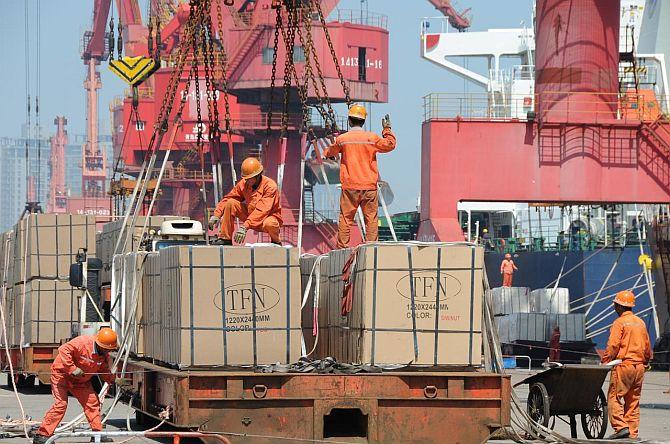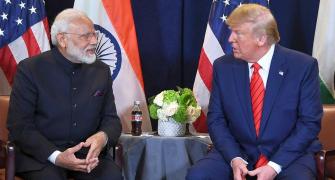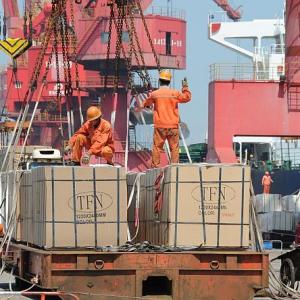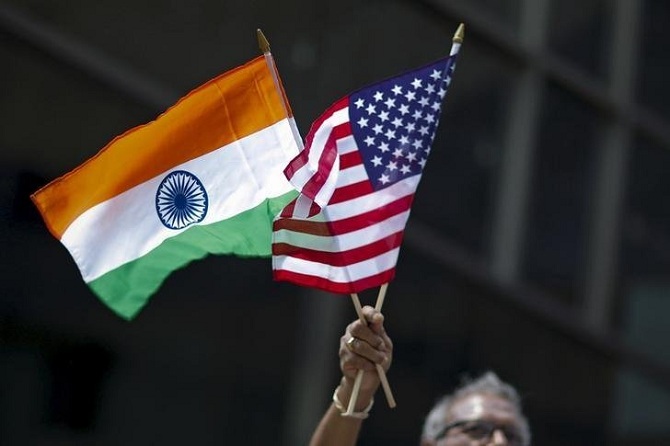Economists caution that the underlying cause could be an alarming drop in demand -- something that’s not good for economic growth.

Economists are not enthused about the trade surplus in June, achieved for the first time in 18 years, as the underlying cause could be an alarming drop in demand -- something that’s not good for economic growth.
The surplus is “certainly not something to rejoice about. Rather, it signals severe slowdown in economic activity weakening the demand for core imports -- that is non-oil non-precious metals imports,” said Rupa Rege Nitsure, chief economist of L&T Finance Group.
“One can rejoice about trade surplus only if it is due to exports being higher than imports. In today’s circumstances, it is a negative rather than a positive signal,” Nitsure said.
In June, exports fell for the fourth month in a row, albeit at a lower rate.
Merchandise exports fell 12.41 per cent in the month, albeit the rate was lower than the 36.47 per cent seen in May and 60.28 per cent in April. Imports fell 47.59 per cent in June, against 51.05 per cent in the previous month, and 58.65 per cent in April. Imports of gold, petroleum products, engineering goods, coal and machinery shrank.
A decline of 41.37 per cent in June, against 43.13 per cent in May, indicated that a recovery in industrial production will take time, say economists.
Exports of $21.91 billion and imports of $21.11 billion resulted in a surplus of around $800 million in June’s trade balance, the first such instance since January 2002’s surplus of $10 million.
Activity and consumer demand has picked up in the US and other major economies over May and June helped by fiscal measures and relaxation of restrictions, which may have supported exports. But, domestic demand has remained depressed on account of a gradual easing of lockdown, according to Gaurav Kapur, chief economist of IndusInd Bank.
According to Kapur, exports may stabilise for now, especially following a fresh wave of Covid-19 cases and re-imposition of restrictions in major global economies. Domestic demand on the other hand should gradually pick up in second half. “Any persistence of a trade surplus should, however, be seen as a weak demand signal and a sign of worry,” said Kapur.
The surplus took most economists by surprise. “The surprise was mainly due to contraction in non-oil, non-gold imports, lower by $3.1 billion month-on-month,” said Indranil Pan, chief economist of IDFC First Bank.
The decline indicates that domestic demand weakness persists despite some easing of lockdown restrictions in June, while the faster recovery in exports is likely due to clearing of order backlogs built up during the lockdown as well as improvement in external demand conditions as restrictions in developed economies have been eased, Pan said.
The sharp rise in cases in the US, India’s largest export market, could negatively impact exports with several American states re-imposing lockdowns. However, the much sharper contraction in imports versus exports could be good news for the current account being in surplus for the fiscal year 2020-21. This is also because of the flows in the telecom and technology space, economists say.
India is likely to post a strong current account surplus in the first quarter of 2020-21. And the trade data indicated that the April-June current account balance could be as much as 3.5 per cent of GDP in surplus, which would be the largest surplus since March 2004, wrote HSBC India’s chief economist Pranjul Bhandari in a note.
“The export recovery portends well for the economy, although it will take some time to reach the previous levels of exports, as discretionary spend will increase only gradually. A decline in machinery and metal imports shows that industry is still very sceptical and rightfully so. However, this also does not augur well for the economy,” noted Soumya Kanti Ghosh, group chief economic advisor of State Bank of India group, in a note.
Comparatively lower oil prices will keep providing support to the trade balance and the country can witness a current account surplus this fiscal year, Ghosh said, adding with a high foreign exchange reserve ($516 billion) and a high import cover, rupee can see further appreciation.
Photograph: Reuters.










